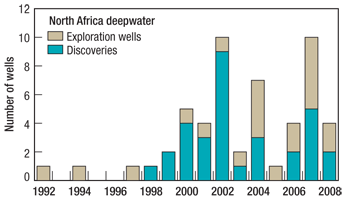DEEPWATER STATISTICAL REPORT
Glimpsing North Africa’s deepwater potential
Craig McMahon, Wood Mackenzie
Recent gas discoveries at Arous Al Bahar in Libya and Anchois in Morocco have heightened interest in North Africa’s deepwater basins. Given its long history of oil and gas production, it is perhaps surprising that the region’s deepwater potential is not better understood and more thoroughly appraised. Outside of Egypt’s sector of the Mediterranean, North Africa’s deepwater prospects remain intriguingly elusive.
So far in the region, more than 1,200 offshore wells have been drilled, but only 7% of these have been in deep water (i.e., > 400 m) and less than 1% in ultradeep water (> 1,500 m). Seventy percent of the 1.3 million-sq-km maritime zone lies in deep or ultradeep water, so the province’s potential is far from being adequately explored.
The last eight years have witnessed a sharp increase in deepwater drilling and a corresponding jump in discoveries, indicative of the relative immaturity of most of the deepwater play, pointing to excellent prospects for further discoveries as drilling activity extends into deeper water, fresh geographies and new plays.

Exxon was the first to explore the deeper shelf in the 1970s, but it was only in 1998 that BG made the first discovery (Saffron-1), in the Egyptian Mediterranean. Egypt has by far the most active deepwater sector, with over 80% of the 92 deep and ultra-deepwater wells to date. The Saffron find was the precursor to 10 years of deepwater success and, since April 1999, 40 deepwater exploration wells have been completed, with a 75% success rate. BP has also made multi-Tcf gas discoveries in the Mediterranean deep water, including the landmark Miocene discovery at Raven Field in 2004.
Shell remains the only player to drill in the ultra-deep, making four discoveries and setting Egyptian deepwater drilling records in the process. These may move to production in the longer term but need to prove up more reserves before Shell commits to a development.
BG’s Scarab, Saffron and their satellite fields remain the only deepwater production in North Africa. Only Egypt has near-term development candidates, including Hess’s West Mediterranean Block 1 (which could be onstream by 2013), and BP’s Raven project, which has yet to take its final investment decision, but could also start up by 2013.
Until recently, Egypt’s success was in stark contrast to the rest of the region: Algeria and Libya have focused on exploiting their onshore basins, and offshore licensing has not had the same attention. Deepwater success has also been elusive in Morocco, despite a high number of licence awards and attractive terms on offer.
The two recent gas discoveries in Libya and Morocco have still to be fully appraised, but give a first glimpse of the potential in other North African deepwater basins and, in parallel with the successes in Egypt, could be the catalyst for a new wave of deepwater activity. International markets for North African gas may have stagnated in the current recession, but the region could find itself well placed to take advantage of a recovery as gas demand rebounds. 
|



